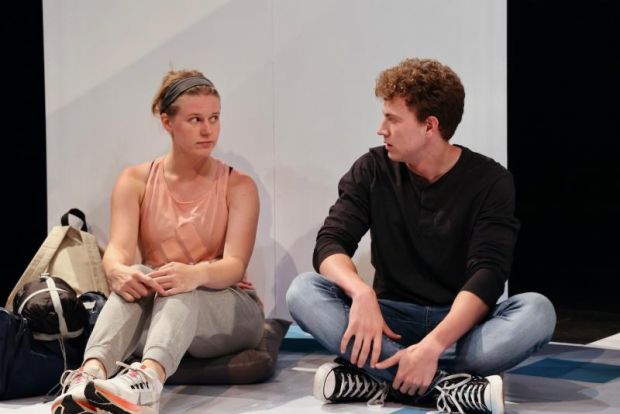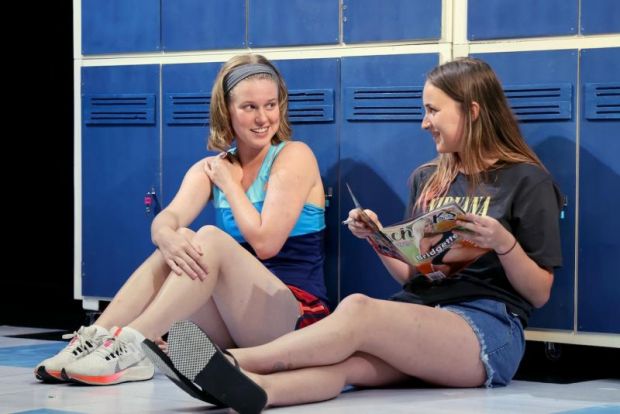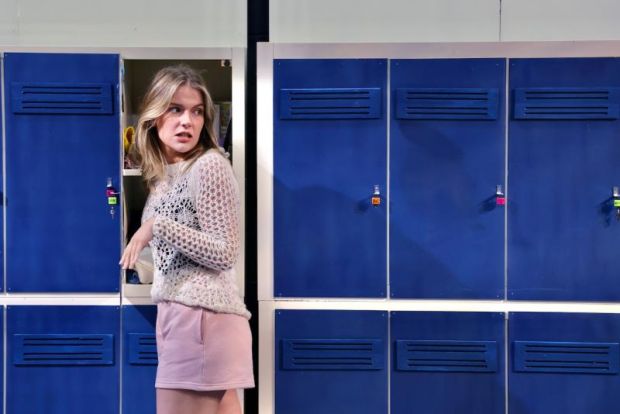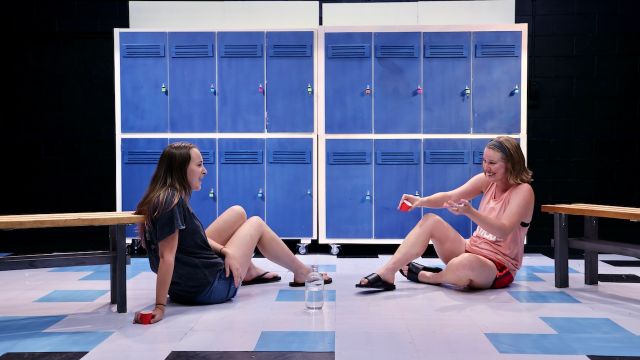Dry Land
Ruby Rae Spiegel’s Dry Land (2014) is the story of a friendship – a turbulent, difficult, advance-then-retreat, accept-then-reject, insult-then-beg, needy, cruel-then-kind, touching but shocking, and very hard-earned friendship.
Amy (Luce Wirthensohn) and Ester (Cassidy Dunn) are in their final year at a Florida high school, and in the swim team. In the pool, it’s simple and safe, there are rules, you train hard, you swim in a straight line, and the aim is to win. On dry land, things are not so clear.
The story plays out in the swim pool locker room, about as private a space or sanctuary as these girls can get. (The very simple but most suggestive set design is by Abbey Stanway, and you can almost smell the chlorine.)

Fast-talking, cynical Amy with her veneer of sophistication, has bought the sexual liberation line; now she’s pregnant. For Amy (and for Spiegel) there is one option: abortion. There’s no debate, no (all too contemporary) discussion of rights and wrongs – like should she keep the baby. The boyfriend’s gone and he doesn’t know anyway. There isn’t – and can’t possibly be – any parental intervention. Amy’s unwanted (and probably stupidly unexpected) pregnancy is the dominant fact.
But this is not a play about abortion. Amy’s pregnancy and what she and Ester do about it is the device, the catalyst if you like, for Spiegel to chart the fraught and ambivalent relationship of these two girls. To adapt a David Mamet maxim, ‘It’s not a play about abortion, it’s about how the characters feel about abortion.’ And each other.

To have a good ear for teen-speak and even to put it on the page, is one thing, but Spiegel goes further; she skilfully and sympathetically shapes and structures the shifts, changes, sexuality and developments of these two characters; she takes us to an almost unbearable climax and leaves us with a most melancholy resolution.
Amy wants no one to know. Paradoxically, if people knew Amy was pregnant, they’d think she was a slut. She can’t trust her BFF Reba (Isabelle Duggan) a more discreet but cynical schtupper, and party girl blabbermouth. So she elects Ester – shy, bumbling, low self-esteem Ester who doesn’t quite know why alpha-girl Amy has picked her, but is kind of flattered, nevertheless… The first line of the play is from Amy: ‘Punch me in the stomach.’ It’s not a test of physical strength. But Ester, not used to doing anything except swimming with Amy, hesitates – pulls her punches. The punches get harder. We wince at them. Later, Ester will bounce on Amy’s stomach. They will drink many shots of vodka. Nothing works - until Amy secures some very expensive drugs… (And nowadays illegal in many US states.)

Director Olivia Staaf is alert to every emotion and cast makes them visible and visceral. But although Staaf and Spiegel expertly take us into the ebbs and flows, the desperation and the denials of Amy’s psychology, it is Ester who holds Dry Land together: she is the subject, particularly in the hands of Cassidy Dunn. It’s one of the finest performances I’ve seen in a long time. Every emotion and fleeting thought flickers across her face so that we feel for her without at all falling in love with her. This is a far from a sentimental play. In the one scene away from the locker room, between Ester and a potential boyfriend, painfully awkward Victor (Endrico Botha) further layers of Ester’s persona are revealed: her mistrust of the world and of herself. It is as if for this girl, uncertain about almost everything, everything is a test.
Spiegel’s adds a scene about a term paper Ester is about to deliver on the Everglades – an attempt at metaphor that doesn’t quite come off. More to the point is the metaphor of blood and a quote from Einstein, that we must look into Nature to understand the world. When the locker room is smeared and pooled with blood, a janitor (Buzz Billman) enters with mop and bucket, earphones in place, moving – almost dancing – to some unheard tune. He’s not startled, shocked or puzzled. It’s a brilliant touch by director Olivia Staaf: the janitor gracefully cleans up the blood, this part of Nature, leaving the floor as if the blood were never there…

Dry Land is a deceptively simple, naturalistic play; it is tough-minded and clear-eyed – and Spiegel was only 21 when she wrote it. The structure is rock solid, the dialogue is cracking, loaded with subtext and the performances are gripping in their insight and truthfulness.
Michael Brindley
Subscribe to our E-Newsletter, buy our latest print edition or find a Performing Arts book at Book Nook.

